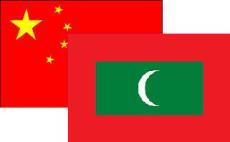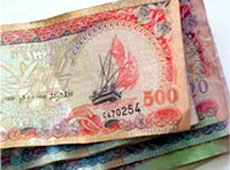Just three weeks to the Maldives’ presidential elections scheduled for September 7, Chief Justice Ahmed Faiz Hussain has announced a mutiny in the Supreme Court!
In a statement issued on Thursday, the Chief Justice declared an injunction order issued by the “Supreme Court majority” of four judges on Thursday to be unlawful, issued without due process by the secret collusion of four members of the seven member bench, without the knowledge of himself and two other justices.
The injunction order is to stop the appointment of a Civil Service Commission (CSC) member to replace the disgraced CSC Chair Mohamed Fahmy Hassan, who was removed from office and CSC membership by the Majlis earlier this year for sexual assault of a staff member. He continued to sit in the office despite the removal, while politicians haggled and MPs pointed the finger at each other and outside to explain his impunity and the absence of rule of law.
No one appeared to understand that it is the Majlis that has the power to appoint and remove CSC members, with the CSC Act having been amended in 2010 for Majlis to take full powers of appointment, oversight and removal of CSC members, or that squatting in public office after removal is a crime.
Also unnoticed, or deliberately ignored in public discussion, are the wider connections of the Fahmy case to the silent coup and the hijack of the judiciary in 2010 with the CSC Chair being an ex-officio member of the Judicial Service Commission (JSC), and the serious and dangerous implications of the Supreme Court mutiny on the upcoming elections.
Discussed in the Maldives on political platforms, media, social media and other public fora is “bad man Fahmy” – the removed CSC Chair at the centre of the controversy; “bad man Ali Hameed” – the Supreme Court justice who has continued to sit on the bench protected by both the JSC and Majlis despite his public expose in the sex tapes scandal where he is seen having sex with multiple foreign women in a Colombo hotel room; and “bad man Abdulla Saeed” – the interim, self declared “Chief Justice” who is said to “lead the majority in the Supreme Court”.
Democracy, in the Maldives, is simplified to a struggle between The Majority and The Minority, with majority by any means deciding all, be it in the Majlis, the High Court, the Supreme Court or elsewhere. Democratic principles and standards, due process and rule of law, transparency and accountability, are all dismissed, the focus of all being on majority building by any means to have their way.
The report of the UN Special Rapporteur on the Independence of Judges and Lawyers issued in May 2013 Ms Gabriella Knaul, highlights the critical issues in Maldives engagement with democracy, and provides insight into the coup of February 7, 2012 like no other report, but remains ignored by government, opposition, civil society and other actors.
Precedent: Mutiny in the High Court
On January 21, 2010 a similar mutiny took place in the High Court, in my opinion the first of the many mutinies that had eventually led to the coup of Feb 7, 2012 and the fall of legitimate government with the forced resignation of President Mohamed Nasheed, the first President elected through democratic process.
The High Court mutiny attacked the JSC, removed the JSC Chair who was the then Chief Judge of the High Court, Abdul Ghani Mohamed, and delivered the Commission to the then Vice Chair of the JSC, now removed Justice of the interim Supreme Court, Mujthaaz Fahmy, who had cleverly manipulated the Commission, committed high treason using public office and the powers of JSC, hoodwinked the public, and delivered the full judiciary intact to former President Maumoon Abdul Gayoom and his allies.
The High Court mutiny was never investigated by the JSC despite a unanimous decision in the Commission in January 2010; the modus operandi of Mujthaaz Fahmy being to give in when challenged in a public display of concession and going behind the back to corrupt any decision he did not agree with.
The first Inquiry Committee appointed by the JSC to investigate the High Court Mutiny never sat, and I, a JSC member at the time, was informed by the Commission that it was due to the non appearance of Inquiry Committee member, then interim Supreme Court Justice, Ahmed Faiz Hussain – now the same Chief Justice who has declared that “the majority” has gone behind his back and there is a mutiny in the Supreme Court.
The Inquiry Committee never sat, and there was no investigation or action against the judges in the High Court mutiny, and eventually they were rewarded with lifetime appointments to the Supreme Court under the careful management of the Majlis majority. The removed interim Justice Mujthaz Fahmy was rewarded for life by the Majlis.
Ironically, but to no surprise, those in the Supreme Court mutiny today are the same “judges” in the High Court mutiny of January 21, 2010, who were appointed to the Supreme Court on August 10, 2010 in a political deal reached by the political leaders and the sitting interim Supreme Court who had by then declared themselves permanent.
The international community itself played by the politicians without a single independent observer to comment, had itself played a role pushing for “calm” and haste over due process and trust, ignoring the politics of it all, and the serious and lasting negative impact on democracy in the Maldives.
The Maldives is today more an active crime scene than a State, and whilst free and fair elections are a necessary first step to come out of the current situation, return to Constitutional rule, and rebuilding the democratic State we failed to build in the first attempt, there is little reason to expect a smooth electoral process.
The final word on the results of the September 7, 2013 elections will surely come from Court and not votes; and it is imperative that the political leaders and the international community come to an agreement on an alternative dispute resolution mechanism leaving the corrupted judiciary out of the process.
Ignoring the serious issues, hoping for the best, and relying on the possible goodwill of the judges given the power of numbers voting, is, unfortunately, no guarantee.
Aishath Velezinee (@Velezinee on twitter) is an independent democracy activist and writer. She was the Editor of Adduvas Weekly 2005-07 and served on the Maldives’ Judicial Service Commission (2009-11). She claims the Commission she sat on breached constitution in transition; and advocates for redress of Article 285, and a full overhaul of the judiciary as a necessary step for democracy consolidation.
All comment pieces are the sole view of the author and do not reflect the editorial policy of Minivan News. If you would like to write an opinion piece, please send proposals to [email protected]
Likes (1)Dislikes
(1)Dislikes (0)
(0)  In September 2012, President Waheed told
In September 2012, President Waheed told  electricity and phone bills if funds were not transferred from the MVR 1.8 billion (US$117 million) Public Sector Investment Programme (PSIP).
electricity and phone bills if funds were not transferred from the MVR 1.8 billion (US$117 million) Public Sector Investment Programme (PSIP).